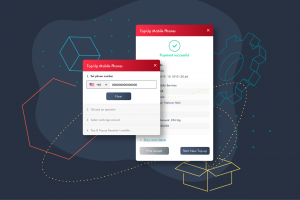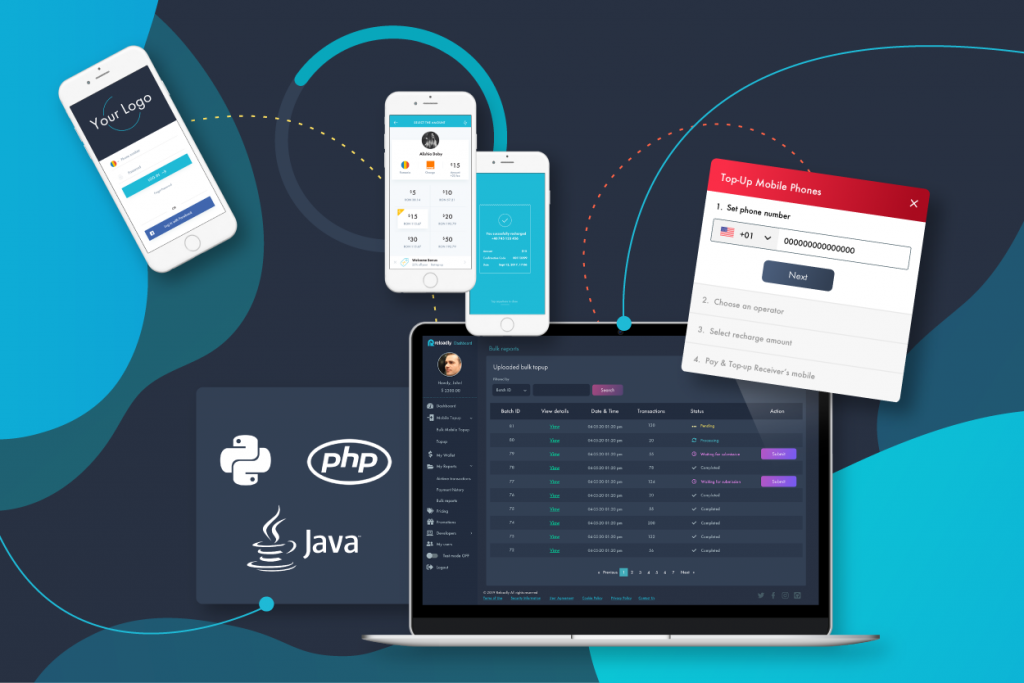Building an international airtime transfer service for your business is not as hard as you may think.
Technology in the space is constantly evolving, and now there are tools made for whatever level of programming skills your team has — from zero knowledge to professional coders.
However, no matter the level of developer, these tools equally aim to take the complexity out of coding, making the integration of an international airtime transfer service a plug-and-play experience for businesses large and small.
Today, there are several tools you and your team should learn about when it comes to building an international airtime transfer service, namely:
- Airtime API
- SDK (Java)
- Widget (Or WordPress Plugin)
- Bulk airtime open-source app
- White label large-scale distribution open-source app
Each one of these above tools is distinct and can serve different use cases for your business.
Some tools are also better suited for certain industries, while others (such as the SDK and white label solution) enable developer teams more potential to completely customize the service to fit their business.
Reloadly provides each one of these above tools for our telco network, which allows businesses to connect directly to over 900 mobile operators in over 140 countries.
These tools are also built with pre-installed integrations to popular payment infrastructure, such as Stripe and PayPal, allowing your business to launch and manage the entire airtime transfer service through one portal.
If you are new to our site, we recommend that you take time to read each of the tools below, as well as sign up for a free, no-contract Reloadly account.
If you and your team are absolute beginners when it comes to programming, we recommend that you first look into how our airtime widget can help you easily introduce an airtime service.
Now, let’s review the five ways you can build an international airtime transfer service for your business.
1. Airtime API
Created for developers by developers, the airtime API is the mainstay of the international airtime transfer service industry today.
Reloadly’s airtime API enables developer teams to easily integrate mobile airtime top-up services directly into websites or apps using a library of codes that programmers will already be familiar with.
As a software interface for interacting with other related services in the telecom and fintech industries, an airtime API crucially provides consistent coding in stable environments that allow for easily replicable functions.
In truth, APIs are already everywhere, even if you haven’t directly interacted with them yet, and they are increasingly responsible for enabling wide-spread technological disruption, especially in the telecom industry.
Thanks to the airtime API, businesses can directly plug into the nexus of global mobile operators. In this way, companies like Reloadly act as an airtime aggregator that provides global telecom access in one place.
Airtime APIs are also packaged to include all related services conveniently in one portal, such as related banking infrastructure and GPS services to generate geolocation information.
Today, airtime API products like those offered by Reloadly play a sizable role in opening up the global telecom market for global businesses.
As a result, customers are increasingly able to enjoy a larger diversity of services made possible with global airtime connections, including services in mobile money, digital payments (such as utilities), crypto exchanges, mobile gift cards and digital goods.
Today, thanks to airtime APIs, developers have an easy and convenient tool to offer customers the exact airtime service they desire.
2. Airtime SDK (Java)
While an airtime API offers an interface for airtime services to interact with related services in the telecom and fintech industries, an SDK — or Software Developer Kit — allows maximum customization.
The common analogy goes that APIs are building blocks, while an SDK is the entire workshop.
Much like an airtime API, an SDK provides a set of tools, developer libraries, relevant documentation, code samples and more.
However, SDKs are the origination source for APIs — as well as most other programs that exist on the internet today.
The Reloadly SDK offers several modules, such as Authentication and Airtime programs.
Developers can also add dependencies for the specific services that are unique to their business, essentially developing unique programs using Reloadly’s proprietary technology.
The Reloadly developer kit currently runs on Java 1.8+, so your developer team will need to at least understand this programming language.
Our developer team is also preparing to release our SDK in other coding languages, including PHP, IOS, Android, Python, .NET and Golang.
3. Airtime Widget (Or WordPress Plugin)

On the opposite side of the developer skill spectrum from the SDK is the humble airtime widget, also called an airtime plugin.
An airtime widget is the simplest tool available for integrating an international airtime transfer service into your business.
In essence, an airtime widget is an easy-to-use software application or component made for one or more different platforms.
Unlike the other four tools on this list, no code or software development is required for integrating an airtime widget.
The Reloadly Airtime Widget now provides WordPress site owners (or users of other CMS platforms) the opportunity to easily install our mobile top-up transfer service into their online business. For WordPress, we have established our own WordPress plugin to install this airtime service.
Furthermore, our developer team is in the midst of rolling out more airtime widgets specifically designed for popular e-commerce platforms, such as Shopify and WooCommerce.
This means that site owners of small and medium-sized businesses without a dedicated developer team can still benefit from Reloadly’s network of over 700 telcos through just one tool.
Read this article to follow a step-by-step guide on how to install the Reloadly Airtime Widget. We also explain what kind of customer experience to expect from this service.
4. Bulk airtime open-source app
Open-source developer libraries have made it convenient for emerging international airtime transfer services to be published for the general public.
Reloadly uses GitHub to publish open-source projects that we believe address a specific in-demand service that can benefit from our developer team’s knowledge.
One of those services is bulk airtime — that is, sending airtime goods or payments in bulk to large lists of mobile numbers, in one region or in many.
Some clear benefits of building a bulk airtime service include:
- The ability to schedule bulk transactions for disbursement
- Sending airtime to multiple countries simultaneously
- Paying out airtime in a variety of foreign currencies (Reloadly offers over 100 currencies)
- Selling bulk airtime to an international network of resellers
The Reloadly open-source bulk airtime project was built and designed to be easily integrated into your website or app, even if you have zero developer knowledge.
That being said, there are a few steps that will require some developer work, such as setting up a programming environment.
Fear not, because we’ve written a step-by-step guide for how to send bulk airtime, featuring screenshots and detailed descriptions of this project, requirements and installation procedures.
Alternatively, this video tutorial also provides a full walkthrough of how to send international bulk airtime top-up using our Github app.
5. White label large-scale distribution open-source app

Publishing open-source projects on GitHub allows our developer team to think outside the box, providing customizable software solutions for businesses.
That endeavour to keep creating ever-more customizable solutions recently led to the publication of a white label airtime project for large-scale distribution.
In essence, we noticed there was a growing demand coming from virtual airtime suppliers that were managing large and dispersed teams of airtime resellers.
This white label large distribution project now offers these businesses a completely customizable international airtime transfer service.
In particular, we developed the project to allow for three different accounts, enabling you to easily manage commissions and finances from the top down.
Similar to our other GitHub app, this project was built to be installed even if you don’t have a degree in computer programming. However, you will have to set up a programming environment, which we explain in this guide to virtual airtime distribution.
Alternatively, this video tutorial provides a full walkthrough of how to set up virtual airtime distribution projects with our Github app.
Final thoughts
Ultimately, which of the 5 tools listed above you end up deploying for your business will largely depend on the scope of your international airtime transfer service, your industry and the level of comfort you and your team have with programming.
For example, if you are a business that operates in the NGO industry without a dedicated developer team, then our airtime API or airtime widget may be the best solution for your needs.
If you have a dedicated developer team, however, you may want to consider one of our open-source projects or our SDK, the latter of which provides all the coding necessary to build your own airtime service using Reloadly technology.
Should you or your team need help to select and to install one of the above tools, please reach out to our support team. We’ll answer you within 24 hours during business days and advise on which software solution works best for your unique case.
If you have further questions regarding Reloaldy’s tools for building an international airtime transfer service, please check our developer help center.



